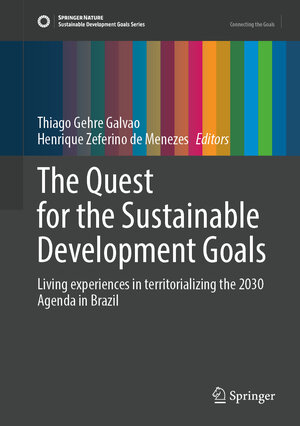
The Quest for the Sustainable Development Goals
Living experiences in territorializing the 2030 Agenda in Brazil
herausgegeben von Thiago Gehre Galvao und Henrique Zeferino de MenezesThe book presents the experiences, complexities, and contradictions of the implementation of the United Nations Sustainable Development Goals in Brazil so far. Through chapters from a variety of stakeholdersincluding political and social actors that go far beyond the federal government, the book examines national, regional, and local aspects of development in Brazil. The book draws from scientific knowledgeand pratical experiences taking a critical look at what the SDGs mean in a Global South country and what the implications of this are for global development.
The first section of the book addresses the critical political and institutional aspects related to the implementation of the Sustainable Development Goals in Brazil, highlighting advances as well as pitfalls and setbacks. The chapters look at broad questions related to the role of civil society in defining political priorities and strategies to move forward with the SDGs in Brazil, as well as the dilemmas for incorporating the SDGs at the different levels of government and other Brazilian institutions. It critically addresses the political and institutional advances and barriers to the progress of the SDGs in Brazil, as well as political and social innovations that emanate from different sectors of Brazilian society.
The second section directly addresses progress made toward the current SDGs in the context of the political, economic and social variables specific to Brazil. The chapters address critical shortcomings and demands for Brazilian society - the need for improvements in the education and employment policies to reduce poverty, the urgent need to increase gender equality and reduce violence, as well as the strengthening institutions and policies to mitigate climate change and protect the environment.
The final section focuses on critically assessing the 2030 Agenda itself, drawing from a Global South IR perspective. The chapters here dialog with decolonial and post-developmentalist perspectives to highlight problems with the agenda and lift up sidelined priorities, presenting yet-unexamined policy solutions and innovations that are currently absent from the global institutional agenda. The Brazilian case is a perfect case to understand how underdevelopment and political instability constrain the paths to sustainable development, while accounting for social innovations, leveraging regional dynamics and utilizing social and cultural diversity can drive sustained progress.



